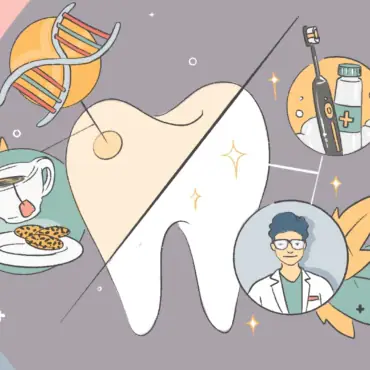Dental marketing is, in a word, key to a dentist’s success.
It’s not about the fancy degree, that doctor of dental sciences, surgery, or medicine that takes years to earn.
Granted, proper academic training is important and can help determine who’s a good dentist and who is not. But in business, the best don’t always win. Those who understand how to attract and retain clients — how to market their businesses — succeed more often than not. Dentistry is no different in this respect.
The following is a comprehensive guide of marketing tools, from traditional strategies to website design to search engine marketing, that will help dentists thrive.
Key benefits of dental marketing
Done well, dental marketing offers a range of benefits. These include:
Brand and practice awareness;
Building stronger relationships;
Finding new ways to grow your practice.
The last one is particularly important. A dentist who simply relies on clients from insurance companies could get left behind. Successful dentists, like any number of different professionals, continually find ways to evolve and attract patients. Innovative dental marketing helps ensure dentists can do this.
Incorporating digital and traditional strategies into your dental office marketing plan
This guide provides a wide scope of marketing strategies, with both digital and traditional methods detailed. Pursuing a diversified and nuanced marketing strategy will help ensure capturing patients through different channels and reaching the broadest possible audience.
Dentist Marketing Basics
First things first. Before spending thousands on a website, before cultivating an Instagram following, before investing in dental marketing books, dentists should focus on the basics.
This means providing great dental service, first and foremost. And it can also mean pursuing some simple marketing strategies, as follows.
Community involvement
Community involvement for dentists can mean joining the local chamber of commerce, sponsoring a local youth sports team, or doing some charity work.
It can also mean more sophisticated work that dentists are uniquely qualified for. Rather than just slinging soup at some random kitchen, dentists can provide low-cost or free dental services for the homeless or other disadvantaged communities, an area of vital need for these groups.
Dental directory listings
Aside from erecting a sign, securing a spot in the phonebook, and getting listed in Google (more on this in a bit), dentists are also wise to get themselves listed in as many dental directories as possible, such as the American Dental Association’s Find-a-Dentist tool, Dentists.com, and Opencare.
Grow your dental practice
Opencare is the only risk-free patient acquisition solution for dentists.
A patient referral system for word of mouth marketing
This can be as simple as asking patients to tell their friends and family if they like the service. A surprising number of patients will do this if asked. A good time to request the referral can be at the end of a positive appointment, provided the patient hasn’t been too heavily-sedated.
Coupons for free cleanings or discounts on pricier services like fillings or root canals can also help spur referrals.
Postcards and mailed offers
Many people only go as often as they must to the dentist. Postcards let people know when this should be, generally every 3-6 months for a cleaning. They also can be a nice way to stay in touch during the holidays or at patients’ birthdays — they can essentially provide dental marketing ideas for any month. In addition, postcards are a low-cost way to convey mailed offers.
Appointment reminders
Granted, a postcard needn’t be the only way to get a patient a reminder for their appointment. A smart dental office marketing plan can include having reception staff call each patient with reminders. Software also exists these days that ties in with point-of-sale systems that can predict when customers will need their next services.
Newsletters
Newsletters might seem a little old-fashioned approaching the midway point of the 21st century. Thing is, they still get read. And dental offices need something for their waiting areas before appointments. A simple four-page newsletter can be a welcome break from the standard magazine fare.
Marketing strategies for dental websites
Once a dentist has a few basics covered, it’s time to get a website going. Here’s how to do it and what to do immediately after.
Create a clean, professional website
More times than not, a patient’s first interaction with a potential dentist will come through their website, perhaps after a directory search or through a customer review website or search engine query. To convert this web visitor into a new patient, a dentist will need a clean, easy-to-understand website.
Building such a site needn’t be too complex. Savvy dentists might even be able to do it themselves. But there should at least be a page describing essential services, a brief biography page, and contact information.
In time, dentists can add more sophisticated features to their websites such as online scheduling, bill payment, or renewal of prescriptions.
Diversify keywords
Keyword research can help dentists to know which search terms to emphasize in their web copy, increasing the chances that patients who do searches on these terms will click on their sites. Diversifying these terms, with both high-frequency and longtail (lower frequency, but highly-specified) terms can help ensure a mix of customers.
Keep your site current with content marketing — and offer value to patients
One common web design mistake that businesses make: Investing handsomely in a new website and then doing nothing after a few months to keep it active. Search engines want to see new active on websites at least once a month. Content marketing, particularly through the implementation of an on-site dental blog is one of the best ways to keep a great website from going fallow.
Aside from offering a way to keep websites live, with superb SEO capabilities, dental blogs are also a good means to connect with customers, educating them on the latest trends impacting their oral health.
Create dental videos and market them
Text isn’t everything. Good dental websites also incorporate short videos. Dental marketing companies can help create them — anything from video testimonials to re-enactments of patient procedures to dental video logs — and then distribute these videos to other destinations around the web, such as YouTube.
Live chat
Good content can help passively convert visitors to dental websites. That said, more active web conversion tools are available these days as well. Live chat is one, with a simple application programming interface (API) able to automatically reach out to any visitor who stays on-site more than a second or two and open the virtual door to a longer conversation with an employee of the dental office.
Remarketing campaigns
Truth is, even the best dental websites won’t convert every visitor their first time through. Every potential customer, after all, follows a different buyer’s journey, some short, some long. For those taking a little more time, remarketing campaigns can be invaluable.
The way remarketing campaigns work is that code is embedded onto a dentist’s website that can track when a visitor stops by. From there, a banner display ad will show elsewhere on the web with an advertisement for the dentist, reminding the potential patient of their visit to the website.
Search engine marketing, social media, and more for dentists
Marketing doesn’t just stop at a dentist’s office or website these days. Here are a few best practices for search engine, social media, and other digital marketing strategies for dentists.
Prioritize local SEO
Less is more when it comes to dental search engine optimization. After all, most dentists’ offices probably won’t need tens of thousands of visitors beating down a path to their websites. In fact, such a metric could be a sign that something’s gone deeply wrong with one’s dental marketing company or consultant and that they might be engaging in click fraud.
Instead, the best SEO strategy for dentists emphasizes local keywords and traffic. It targets a specialized segment of local traffic, clearing out useless non-customer traffic and narrowing competition.
To this end, every dentist is wise to update their Google My Business page, helping ensure they won’t fall behind local competitors.
Google AdWords
Good marketing leads to organic web traffic. But this takes time. In the interim, a modest Google AdWords campaign of even a few hundred dollars can generate local traffic and help dentists get more patients from the web. These days, Google Ads also have tools built-in to add in location, calls, and customer reviews.
Request reviews
Many businesses have a wealth of customers who’d be happy to say nice things about them, if only they were asked. In that respect, dentists can grow their review pages, through portal sites like Yelp and in their Google business listings, by continually encouraging customers to review them.
Cultivate social media
As with near any business these days, dentists can use social media sites like Facebook, Instagram, and Twitter to connect with existing customers — with social media a particularly effective tool for dealing with customer service issues — to marketing to potential ones. Creating shareable images and posts can help ensure messages spread throughout social channels.
Use email marketing to stay in touch with patients
Like postcards or paper newsletters, email marketing is another tool to reach customers. Through sites like MailChimp and Constant Contact, dentists can let patients who — and this is important — consent to email contact, generally via an on-site opt-in form, hear the latest about what’s going on with the dental office and receive special offers.
App-etize!
So much web traffic these days is mobile. Dentists can capitalize on this, either by building a mobile app in-house or with the help of a consultant or dental marketing company. Apps can be used for scheduling, bill payment, and more.
Make use of dental booking appointment platforms
Many of these exist and are helpful for dentists looking to book appointments online beyond their websites. Essentially affiliate marketers, these sites bring leads in exchange for a fee.
10 mistakes: Dental marketing strategies to avoid
Beyond the list of things to do, here are 10 marketing strategies for dentists to avoid:
Fear: Sure, many patients might have egregiously bad dental hygiene habits. That said, dentists are smart to avoid stoking fear in their marketing materials. This is because online marketing is trending toward positive, informative, and helpful content.
Keyword stuffing: This went out of vogue around 2000, though unscrupulous (and clueless) marketers sometimes still recommend it.
Ignoring trends: What works today might not work in six months.
Spam: This is pretty basic — never send emails to potential or current customers who haven’t opted in.
Outdated website design: E.g. Flash; something that isn’t mobile friendly; anything designed more than a few years ago.
Online reputation ignorance: It’s tough, but anyone can say anything these days. Smart dentists stay on top of what’s written about their businesses online and know when and how to appropriately respond.
Getting too bent out of shape by one negative review: The flip side to No. 6 is caring way too much about one less-than-perfect review. The occasional one or two-star review is a blessing. It legitimizes all the four and five-star reviews and allows businesses to own their mistakes, a great tool for attracting new customers.
Purchasing social media followers: Nothing can get a social media page flagged and removed quicker.
Relying too heavily on one method or channel: Again, diversity is key.
Trying to go it alone: At the end of the day, everyone has their area of specialty. Dentists are dentists first and foremost. While it’s great when dentists have some marketing savvy, working with a consultant or firm can help take them to the next level.
Your Ultimate Guide to More Customers.
Need another way to find patients for your dental business? Sign your practice up for Opencare and start getting more patients today.
Grow your dental practice
Opencare is the only risk-free patient acquisition solution for dentists.








